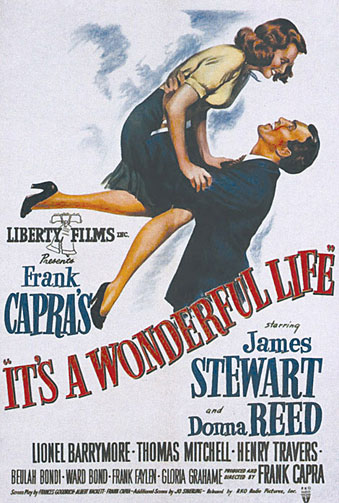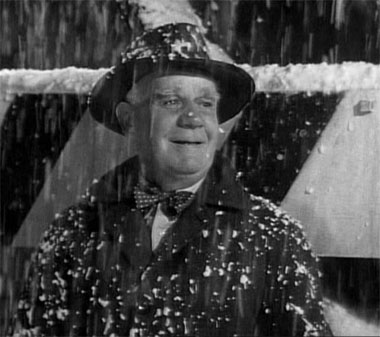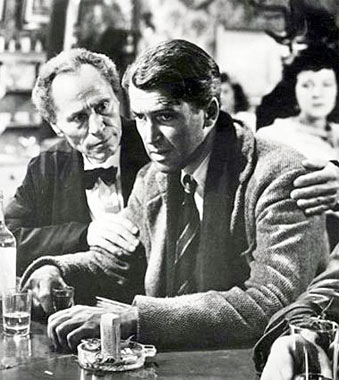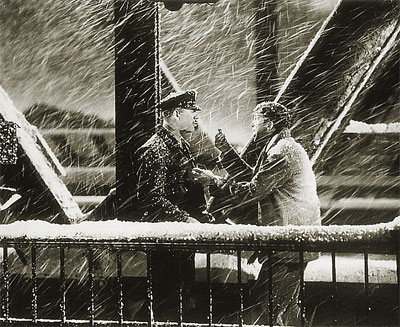




2009 Skelly Family Christmas
While mortals sleep, the angels keep Their watch of wondering love. |
 |
 |
 |
 |
 |
| Christmas Weblog | Christmas Past | Christmas Present | Christmas Yet to Come |
| Christmas '08 |
| Christmas '07 |
| Christmas '06 |
| Christmas '05 |
| Christmas '04 |
| Christmas '03 |
| Christmas '02 |
| Christmas '01 |
| Christmas '00 |
| Christmas '99 |
|
It's a Wonderful Movie
What is probably the most beloved—and certainly the most watched—Christmas treasure ever put on celluloid used to be given away in the 1980s. TV stations ran it all day long as a schedule filler throughout the Christmas season, and many didn't pay even a dime in royalties.
Next Posting: Christmas Day (including first annual Skelly Christmas Video). Don't miss out!
How did things ever get so out of hand? That's what the people at Republic Films, who owned the movie, wondered as they watched money that should be theirs race right past their door and jump into the pockets of others. They had their lawyers working on it night and day.
Some overpaid, lower-level functionary had screwed up, again, no doubt. He, or she, had failed in the simple act of renewing a copyright, and now everybody and his brother believed that the film was in the public domain and could be aired for free. And that's what they did, Over and over and over again. It's a Wonderful Life premiered in December 1946 with an all-star cast and the future of a newly launched independent production company, Liberty Films, riding on its fortunes. They were looking for a big hit. They would be disappointed. It wasn't exactly a total flop. It garnered five Academy Award nominations, including Best Picture. It was the 23rd highest grossing film of 1947, out of 400 made. But it had been expensive to produce and was up against some stiff competition. And its message might have been a little dark for a nation recovering from the economic and psychological wounds of a World War. What else is on TV?
Does your holiday spirit soar beyond Capra? Click Here for a list of other holiday TV listings. It's not an exhaustive list—who can keep up with the Family Channel?—but you'll be an emotional wreck if you watch everything listed here. For those whose idea of viewable seasonal fare tracks a far narrower path, Click Here for the College Bowl Game lineup.
Best Picture Oscar Winner that year, The Best Years of Our Lives, was grim and gritty, too. But it was a little more down to earth, so to speak, dealing with life triumphing over the travails and dislocations of a war that had been won, as opposed to the trials and dislocations of living with our darker angels, a battle that goes on. It's a Wonderful Life's box office failed to even match a production cost that reportedly exceeded $3 million, and to be considered a financial success it should have doubled that.

That pretty much cashiered the hopes of Liberty Films before it even got started. It made just one more movie and sold out to Paramount. That also put an end, incredibly, to the stellar Hollywood career of It's a Wonderful Life's director and producer and one of the founders of Liberty, Frank Capra. Capra had been a film industry giant in the years before World War II. His movies included It Happened One Night, Meet John Doe, Mr. Deeds Goes to Town and Mr. Smith Goes to Washington. He'd won three Oscars for Best Director During the war, Capra was commissioned as a Major in the US Army and directed or co-directed eight documentary propaganda films between 1942 and 1948, including the seven-episode Why We Fight series, which won him yet another Academy Award. But after the war, Capra wasn't so sure he wanted to return to the hidebound Hollywood studio system where directors labored for the pleasure of a studio executive rather than the public. And for its part, Hollywood probably wasn't so sure they wanted him back. Successful as he was, he had a reputation for producing expensive movies and had a penchant for dark, philosophical and money-losing projects from time to time. There were surely some who felt that in the time he had invested in the war the industry had passed him by. After It's a Wonderful Life, most of the deep thinkers in Hollywood were convinced that the Capra magic was gone. He made a few more films, none blockbusters (Paramount gave him a five-picture deal as part of the buyout), but that was it. He ended up doing TV, where it was thought big-time directors went to die in those days. And that's where the matter would have sat. Who remembers next year who the Yankees beat last year in the World Series? Or what director won Best Picture in 1947? With the passage of time, new triumphs and disasters crowd their way onto the center stage of life, just itching for their own chance to be forgotten. But in the background, the dizzying rituals of corporate tribal dancing were playing themselves out. Liberty had remained a mostly forgotten Paramount subsidiary until 1951 when the company was officially dissolved. 
Paramount then sold Capra's movie along with certain key rights and the musical score to M & A Alexander, a film distributor, in 1955. Who in turn sold the whole kit and caboodle to National Telefilm Associates (NTA) (the successor company to a conglomerate namd U M & M), who in the fullness of time assumed the corporate identity of Republic Pictures. Republic was a very old studio name. The original company used to make Westerns. Aaron Spelling eventually bought Republic in 1994 and just as eventually sold it to Viacom in 1999. It was an NTA clerical error that prevented the copyright from being renewed properly in 1974. Which put the movie in the public domain. Despite the lapsed copyright, television stations that aired It's a Wonderful Life would still have been required to pay some royalties. It was only the film's images that had entered the public domain, The story itself, based on a published short story entitled "The Greatest Gift" was still protected. Its copyright had last been properly renewed by Philip Van Doren Stern, its author, in 1971. Even the score, by noted score composer Dimitri Tiomkin, had a copyright of its own. |

Such petty legal proprieties made but a small dent in the mindset of a nationwide clot of TV stations already at full gallop. It was like trying to tell a bunch of buffalo they shouldn't be stampeding. Station managers had figured out what 1947's movie-going audience and N.Y. Times film critic Bosley Crowther had not: this was a really good film, especially at Christmastime. And best of all, in the true spirit of the season, it was a gift.
Finally, in 1993, Republic Pictures relied on a 1990 U.S. Supreme Court ruling to argue for its claim to the copyright. While the film's copyright had not been renewed, the plaintiffs contended its status was as a derivative work of another work still under copyright. Perfectly clear? It was to the court. In an unprecedented ruling concerning an expired copyright, Republic prevailed. As things stand now, according to Wikipedia, NBC is currently licensed to show the film on U.S. network television, and traditionally shows it twice during the holidays, with one showing on Christmas Eve. Viacom's 1998 acquisition of Republic's then-parent, Spelling Entertainment, gives it ancillary rights to the film, while NBC's broadcast rights are licensed from Trifecta Entertainment & Media, which holds television distribution of the Republic/Paramount theatrical library. Capra should have made a Christmas movie about lawyers.
The Christmas season is a wonderful time for irony, especially when tinged with pathos. So in the true spirit of the season consider the following. We have met the enemy and he is us. Fellow director William Wyler was one of Frank Capra's fellow founding partners at Liberty. But first Wyler owed one more movie to The Samuel Goldwyn Company. The film that he made for them was The Best Years of Our Lives, which knocked out It's a Wonderful Life at the Academy Awards, winning seven Oscars overall and four of the five Oscars the latter movie was up for. It also made almost four times as much money at the box office. Wyler tanked his new company before he even started work there. What goes around, comes around. As a subsidiary of Viacom, Paramount Pictures, on the basis of that last Spelling Entertainment merger/acquisition deal, gained ownership of It's a Wonderful Life. Again. After 60 years. Success based on failure. It's a Wonderful Life became a perennial holiday favorite in large part because so many people got to watch it each holiday season on so many local chaannels. And that was only because, by virtue of it's being a financial failure, everybody had forgotten about it. Now that it's a huge success, nobody can forget about it, but people don't get to watch it so much anymore. Everyone wants to get into the act. In 1947, some Hollywood confidant told the FBI that It�s a Wonderful Life was an example of Communist infiltration in the motion picture industry. The idea being, the film's "obvious" attempt to discredit bankers was a tactic commonly employed by Communists. An interesting assertion. Capra was a registered Republican and active in the anti-Communist cause. The IMDB movie website points out that Capra's philosophy tended to champion the individual and that the crowd in a Capra film is invariably wrong. The FBI: any wonder they missed on WMD? In 1998 It's a Wonderful life was recognized by the American Film Institute as one of the 100 best American films ever made, and placed number one on their list of the most inspirational American films of all time. Not an Oscar, maybe, but Merry Christmas anyway, Frank, from one gift that really has kept on giving. Capra died in 1999 but lived long enough to see the resurrection of what he—and Jimmy Stewart, too—thought of as their finest work. "It's the damnedest thing I've ever seen," Capra told The Wall Street Journal in 1984. "The film has a life of its own now, and I can look at it like I had nothing to do with it. I'm like a parent whose kid grows up to be President. I'm proud, but it's the kid who did the work." 
Merry Christmas to you, too, Clarence. You, also, did some fine work. No doubt Heaven is a cheerier place once you;ve got your wings. But if you should get a few spare moments, we could use your help again. Things are still pretty messed up down here. Only if you do come, please, don't drop into the swimming pool. Just ring the bell. |
||||||||||||||||||||||||||||||||||||||